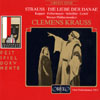Strauss Die Liebe der Danae
Despite recorded sound that's inferior to its up-to-date Garsington rival, this 1952 Salzburg version parades a strong cast, and really captures the essence of the opera
View record and artist detailsRecord and Artist Details
Composer or Director: Richard Strauss
Genre:
Opera
Label: Orfeo
Magazine Review Date: 5/2000
Media Format: CD or Download
Media Runtime: 164
Mastering:
Mono
ADD
Catalogue Number: C292923D

Tracks:
| Composition | Artist Credit |
|---|---|
| (Die) Liebe der Danae |
Richard Strauss, Composer
Anneliese Kupper, Danae, Soprano Anny Felbermayer, Xanthe, Soprano August Jaresch, First King, Tenor Clemens Krauss, Conductor Dorothea Siebert, Semele, Soprano Erich Majkut, Second King, Tenor Esther Réthy, Europa, Soprano Franz Bierbach, Fourth King, Bass Georgine von Milinkovic, Alkmene, Mezzo soprano Harald Pröglhöf, Third King, Bass Josef Traxel, Mercury, Tenor Joseph Gostic, Midas, Tenor László Szemere, Pollux, Tenor Paul Schöffler, Jupiter, Baritone Richard Strauss, Composer Sieglinde Wagner, Leda, Contralto (Female alto) Vienna Philharmonic Orchestra Vienna State Opera Chorus |
Author: Alan Blyth
Where second-rank works are concerned, the extent to which performance quality can change one's perspective is exemplified by this set of the premiere of Strauss's penultimate opera. Last month I was lukewarm about the piece: hearing it done here by singers steeped in the Strauss tradition and with voices appropriate to his music, the work sounds much more convincing. In fact, I was enthusiastic about this reading when it appeared briefly on LP some 21 years ago, not least thanks to Krauss's complete understanding of the idiom and the superb playing of the Vienna Philharmonic. Excellent as Howarth and his players were at Garsington, there is a special frisson of authenticity here that they cannot match.
Even more important, Anneliese Kupper, in the title-role, though possessing an essentially less attractive voice than Orla Boylan, creates a real character through the aegis of her expressive phrasing and keen diction. Schoffler has the vocal weight and presence his Garsington counterpart lacks and, obviously, better German: indeed, he is Jupiter to the life. Gostic's voice, hovering between the lyric and the heroic, provides all the ardour the part of Midas calls for, showing that in this late work Strauss for once wrote sympathetically for his tenor. All the Viennese stalwarts (many of them renowned names) engaged on the smaller roles surpass their Garsington interpreters.
Of course, the sound hasn't the breadth and colour of the new version, and there are a few cuts which Garsington restored, but if you want to understand what this piece is about, this Salzburg Festival set is the one to have - though, unfortunately, you will have to do without a libretto.'
Even more important, Anneliese Kupper, in the title-role, though possessing an essentially less attractive voice than Orla Boylan, creates a real character through the aegis of her expressive phrasing and keen diction. Schoffler has the vocal weight and presence his Garsington counterpart lacks and, obviously, better German: indeed, he is Jupiter to the life. Gostic's voice, hovering between the lyric and the heroic, provides all the ardour the part of Midas calls for, showing that in this late work Strauss for once wrote sympathetically for his tenor. All the Viennese stalwarts (many of them renowned names) engaged on the smaller roles surpass their Garsington interpreters.
Of course, the sound hasn't the breadth and colour of the new version, and there are a few cuts which Garsington restored, but if you want to understand what this piece is about, this Salzburg Festival set is the one to have - though, unfortunately, you will have to do without a libretto.'
Discover the world's largest classical music catalogue with Presto Music.

Gramophone Digital Club
- Digital Edition
- Digital Archive
- Reviews Database
- Full website access
From £8.75 / month
Subscribe
Gramophone Full Club
- Print Edition
- Digital Edition
- Digital Archive
- Reviews Database
- Full website access
From £11.00 / month
Subscribe
If you are a library, university or other organisation that would be interested in an institutional subscription to Gramophone please click here for further information.




